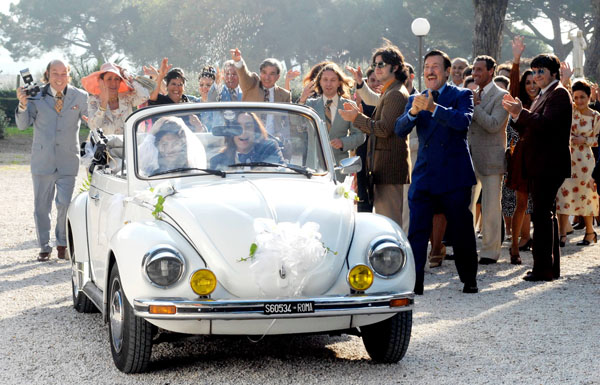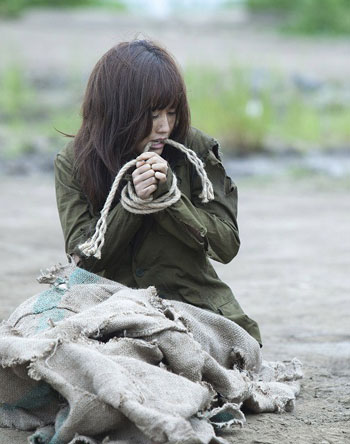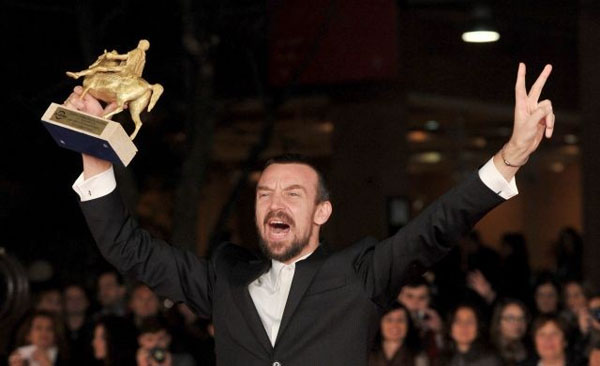There hasn’t been much noise coming out the Italian capital since the 8th Rome Film Festival opened on Friday, but the modest hum may crescendo as the stars roll in later this week. As Beth Hanna noted the other day at Thompson on Hollywood, Jonathan Demme, Wes Anderson, Roman Coppola, Spike Jonze, John Hurt, Álex de la Iglesia, and Italian comedian Checco Zalone are all slated to give “Movie Talks”; and Cineuropa‘s Camillo de Marco highlights a master class to be given by Tsui Hark as Olivier Assayas presents him with the festival’s Maverick Director Award.
“After a turbulent first edition,” begins Michael Rosser at the top of a sweeping overview for Screen, festival director Marco Müller “is back for a second term. The festival veteran of Rotterdam, Locarno, and Venice has once again faced political turmoil due to a shake-up at Rome city hall and infighting between festival stakeholders over the summer.” Variety‘s Nick Vivarelli notes that Müller insisted on a world-premiere-only lineup last year. This time around, he’s “taken a different tack. He’s turned more populist and cherry-picked some recently unveiled films,” including Spike Jonze’s Her, Bong Joon-ho’s Snowpiercer, Jean-Marc Vallée’s Dallas Buyers Club, and Scott Cooper’s Out of the Furnace.
Rome 2013 has officially opened with The Fifth Wheel, “whose mark of distinction is that the story spans 46 years of recent Italian history,” writes Deborah Young in the Hollywood Reporter. “Starring Elio Germano as a humble, honest Everyman who moves from job to job as the country goes from bad to worse, the Fandango/Warner Bros Entertainment Italia production is facile at best and could have been funnier. But Giovanni Veronesi (director of the Manual of Love film series, the last one starring Robert De Niro) has a confident feeling for local audiences’ taste.” More from Variety‘s Justin Chang.
On a somewhat similar note, here’s Jordan Mintzer, also in THR: “A stylish and whimsical ensemble dramedy that never quite hammers it home in the plot department, writer-director Davide Ferrario’s 45th Parallel (La Luna su Torino) tracks three 30-40 something housemates looking for love, and life’s answers, in the northern Italian city of Turin. Not unlike an extended episode of Friends, but with less laughs and more cinematic pontificating, this mildly engaging effort from the former film critic and distributor—whose features After Midnight and Primo Levi’s Journey were both released in the U.S.—is more suitable for local tastes.” More from Camillo de Marco at Cineuropa.
Updates: Jordan Mintzer‘s got another one in THR: “Best described as a minimalist, deadpan, Turkish-language take on Alfred Hitchcock’s Vertigo, the bluntly titled I’m Not Him (Ben O Deglilim) follows a lonesome 50-year-old man as he starts an affair with a mysterious co-worker, and then slowly—very, very slowly—takes on the identity of her imprisoned husband. Despite a grueling 2-hour-plus running time…, this fifth feature from writer-director Tayfun Pirselimoglu (Hair) can be both clever and surprising, making for a rather bizarre double bill if coupled with the brilliant Hitchcock original.” More from Jay Weissberg in Variety.
And Deborah Young: “Fedor Bondachuk is hardly the first director to bring the legendary battle of Stalingrad to the screen, one of the bloodiest confrontations in World War II and a turning point in the war. Stalingrad 3D is, however, the most ambitious production to tackle the subject. The first Russian film to be entirely shot in 3D and released in the 3D IMAX format, it is a strange cross-breed between an old-fashioned WW2 epic full of genre clichés and a modern update whose meticulous historical recreation is frighteningly real.” More from Jay Weissberg in Variety.
Updates, 11/11: “A relentless pharmaceutical salesman gets a nasty dose of his own drugs in The Medicine Seller (Il venditore di medicine), writer-director Antonio Morabito’s kinetic and politically charged Italian drama,” writes Jordan Mintzer.
Then there are three more reviews from Deborah Young: “Inspired by the unusual and ultimately tragic life of Armida Miserere, one of Italy’s first female prison governors, Like the Wind reaches for gripping biography through its talented protag Valeria Golino, but the key keeps slipping out of reach of the slow-moving, repetitious screenplay.”
#2: “One of the most authoritative filmmaking voices on the subject of Naples is certainly Vincenzo Marra, whose fifth documentary on his natal city, The Building Manager, uses the clever ruse of following a property administrator on his rounds of high- and low-rent neighborhoods. Watching him patch up crumbling walls and long-running tenant quarrels does offer an insider’s glimpse into people’s lives, but as might be expected, there is a lot of scope for boredom.”
And #3: “For decades young Iranian directors imitated the essential neorealist style of Abbas Kiarostami; now they use the relational cinema of Asghar Farhadi as their model and Acrid, the first feature by writer-director-producer Kiarash Asadizadeh, is a typically disappointing result.”
Updates, 11/15: “The deities of Mount Olympus descend to the streets of New York City, where they wreak havoc on mortals and much worse on the audience, in Marc Turtletaub’s myth-inspired comedy, Gods Behaving Badly,” writes Jordan Mintzer. “Rounding up a cast of stars—many who had their heyday two decades ago—this outdated, unfunny satire feels like an extended SNL sketch from the early 90s, and one that probably would have been tossed into the wastepaper basket.” And Screen‘s Lee Marshall finds that “this mild-mannered bubble of a film is too fatally frothy and empty-headed to pursue the satirical point: and Sharon Stone, Christopher Walken, Alicia Silverstone and the rest are left to flounder their way through an increasingly silly script.” More from Jay Weissberg in Variety.
Mintzer also reviews Victor Goncalves’s The Invisible Life (A Vida Invisivel), a “belabored and obscure exercise in experimental storytelling,” Andrei Gruzsnickzki’s Quod Erat Demonstrandum, a “slow-burn, politically charged drama that revisits the dog days of Romania’s dictatorship,” and: “A floundering actor finds a new vocation as the star of a tangled crime scene reenactment in Playing Dead (Je fais le mort), a smart and frequently funny caper comedy from writer-director Jean-Paul Salome (Female Agents).”
One more: “The dynamic duo behind My Dinner with Andre and Vanya on 42nd Street take on another classic of the stage in their big-screen Henrik Ibsen adaptation, Fear of Falling. With Jonathan Demme replacing the late Louis Malle at the helm, this terrifically performed version of The Master Builder—based on a screenplay by Wallace Shawn, from his own translation of the Norwegian text—channels the rage, joy and delusions of an aging architect’s final days, where a ghost from his past (played by the exuberant Lisa Joyce) guides him to the great beyond.” The film benefits “from a superb veteran cast that includes actor-director Andre Gregory, Larry Pine, Julie Hagerty and leading man Shawn—who has been developing the project for the last 14 years.” But for Variety‘s Justin Chang, “there’s little to show for all the effort.”
“A legendary film some 30 years in the creative making and long awaited by film cognoscenti has finally been unveiled,” announces Deborah Young. “But Hard to Be a God, a work that would have been revolutionary in the 80s, no longer feels all that cutting edge; it simply feels frustratingly incomprehensible. While advances in CGI have made highly detailed alternate universes commonplace on screen, the idea here is not entertainment, and the non-stop onslaught of revolting imagery is enough to turn off any viewer with a slightly queasy stomach. In any case, familiarity with the 1964 cult novel by Boris and Arkady Strugatsky on which it is based, or at least a detailed plot summary of the book, is a must before approaching Aleksei German’s three-hour black-and-white opus, which is even more confusing, if possible, than its 1998 predecessor Khrustalyov, My Car!” More from Jay Weissberg in Variety.
Updates, 11/16: “Italian director Alberto Fasulo’s TIR, a docu-like drama about a truck driver dealing with his job, his wife, and life on-the-road all over Europe, took the top prize,” the Golden Marc’Aurelio Award for Best Film. Variety‘s Nick Vivarelli: The Rome jury, headed by U.S. helmer James Gray, awarded the best director nod to Japanese genre master Kiyoshi Kurosawa for Seventh Code, his first pic shot outside Japan.”
Seventh Code‘s also scored an Award for Best Technical Contribution for Koichi Takahashi. As it happens, the Hollywood Reporter‘s Deborah Young is not particularly wild about this one: “One of the more trivial entries in Kiyoshi Kurosawa’s filmography…, Seventh Code is a 60-minute shaggy dog story about a pretty girl stalker who runs around Vladivostock in search of a man she met once. It has its funny moments, and a nice final-reel reversal that should hook YA audiences when it plays on Japanese TV, but in Rome competition it looked slight and odd.” Dan Fainaru in Screen Daily: “Taken separately, each of the film’s sequences are shot and directed with the smooth, precise authority that clearly attests to Kurosawa’s high professional standards. That they don’t seem to make much sense together suggests that Kurosawa may not have been terribly interested in the whole project.” Variety‘s Jay Weissberg: “Notwithstanding a few amusing scenes and a general air of unpredictability, Seventh Code barely manages to fill up its 60 minutes with a cohesive narrative.”
The Special Jury Prize goes to Andrei Gruzsniczk’s Quod Erat Demonstrandum. The acting awards: Matthew McConaughey for Dallas Buyers Club, Scarlett Johansson for Her, and the Award for Emerging Actor or Actress goes to the entire cast of Gass (Acrid).
Award for Best Screenplay: Tayfun Pirselimoğlu for Ben o değilim (I Am Not Him). Special Mention: Cui Jian for Lanse gutou (Blue Sky Bones). Once again, Deborah Young: “A story about Chinese history told by a computer hacker ought to be more fun than Blue Sky Bones (formerly known as The Blue Bone), a confused tale about music and roots that never gets beyond the basic chords.” This is the “first feature to be directed by Cui Jian, one of the China’s early rock stars and an influential musical force during the 1989 Tiananmen Square protests.”
The festival’s posted a full list of awards, including those presented in sections other than the Competition. Also: this year’s collateral awards, i.e., awards presented by independent entities.
Meantime, a few more reviews. “A potentially powerful subject is given a rather underwhelming going-over in Foreign Bodies (I corpi estranei), the third feature from Italian writer-director Mirko Locatelli (The First Day of Winter),” writes Jordan Mintzer. “Featuring the terrific Filippo Timi (Vincere, The American) in a restrained but moving performance, this story of an impoverished father caring for his cancer-stricken child, and discovering Milan’s marginal Arab population in the process, is far too withdrawn from the plot and characters to hammer its message home.”
Jay Weissberg in Variety: “Sometimes autobiography is best left locked in a drawer rather than developed onscreen, and Nils Malmros’s Sorrow and Joy is a perfect case in point.”
“Four seasoned lawbreakers and an indebted city sewer employee gang up to break into the underground vault of a bank in the lukewarm Neapolitan heist movie Take Five, from Italian director Guido Lombardi.” Boyd van Hoeij in the Hollywood Reporter: “Though the idea of a Naples-set caper film is intriguing—a potential cross between Gomorrah and Ocean’s Eleven—and Lombardi casts some impressive local mugs in the main roles (even if not all of them are exactly fine actors), the film’s unfortunately a low-energy affair that often looks as murky as its plot is convoluted.”
Update, 11/17: Boyd van Hoeij in the Hollywood Reporter on the big award-winner, TIR: “Though scripted, the film feels extremely documentary-like, with main actor Branko Zavrsan (from the Oscar-winning film No Man’s Land) actually driving a huge truck for over 18,000 miles during the film’s shoot and interacting with real truck drivers and clients who have no idea he’s an actor. The result is certainly life-like but also dramatically undernourished, as during its 86-minute running time, TIR manages to gives a good idea of how monotonous and boring this on-the-road job can be but little else, with too little done in the characterization department for audiences to really care about the protagonist or his problems.”
Updates, 11/18: “Sure,” grants Screen’s Lee Marshall, TIR subjects us “to long periods of the same grinding work routine that separates Branko (also the character’s name) from house and home—but the end mostly justifies the means. For this is a tragedy about the pressures of work in a recessionary economy which allows its victims to live by taking away one of the things that makes life worth living: time of your own.”
“Solid, intermittently engrossing yet rarely vital,” finds Variety‘s Jay Weissberg.
Deborah Young in the Hollywood Reporter: “No one is going to fall asleep during The Mole Song – Undercover Agent Reiji (Mogura no uta – sennyu sosakan: Reiji), two hours of pure energy from Japan’s prolific if uneven bad-boy director Takeshi Miike. An all-stops-out cops vs. yazuka farce featuring the director’s usual day-glow colors, outrageous costumes and high-volume sound effects, its humor sometimes tips over into full-on exotica, but its kooky invention never stops for breath.” Jay Weissberg for Variety: “Firmly set in the director’s cartoonish mode, this nonstop action-comedy about an inept police mole busting Japan’s biggest drug ring wears its manga roots with pride, overstuffed with kooky characters behaving in a suitably exaggerated manner.”
Update, 11/19: “Now the festival is over,” writes Kaleem Aftab for Filmmaker, “Müller and his team will need to decide whether their move away from purely world premieres was a success. No doubt the increase in ticket sales that the festival saw this year will be the deciding factor, but for cinephiles there was no discernible improvement in the quality of the program. And that is a very bad thing indeed.”
Update, 11/22: “The life of a Welsh teenage girl goes from bad to worse in Another Me, and the same could be said of the movie itself, a wannabe adolescent psycho-thriller from Catalan director Isabel Coixet,” writes Boyd van Hoeij in the Hollywood Reporter. Also: “An intrepid 8-year-old Jewish kid from the Warsaw ghetto has to fend for himself during much of WWII in Run Boy Run (Lauf Junge Lauf), an adaptation of the bestselling children’s book by Israeli author Uri Orlev from German director Pepe Danquart. The film is so old-fashioned, it seems to suggest that the director’s mere nationality is so shocking that everything else had to be played as safe as possible.”
Update, 12/25: From Olaf Möller‘s report for Film Comment: “Müller might not be able to secure many of the ‘hot’ European and U.S. art-house premieres, i.e., the sales agent–controlled output that Berlin, Cannes, Venice, and Toronto run on, but he does score films from old haunts not yet under the sway of that particular cabal, where friendship still counts for something—Russia and other former Soviet republics, the Chinas, Japan, and India, as well as the Middle East and North Africa.”
For news and tips throughout the day every day, follow @KeyframeDaily on Twitter and/or the RSS feed. Get Keyframe Daily in your inbox by signing in at fandor.com/daily.









